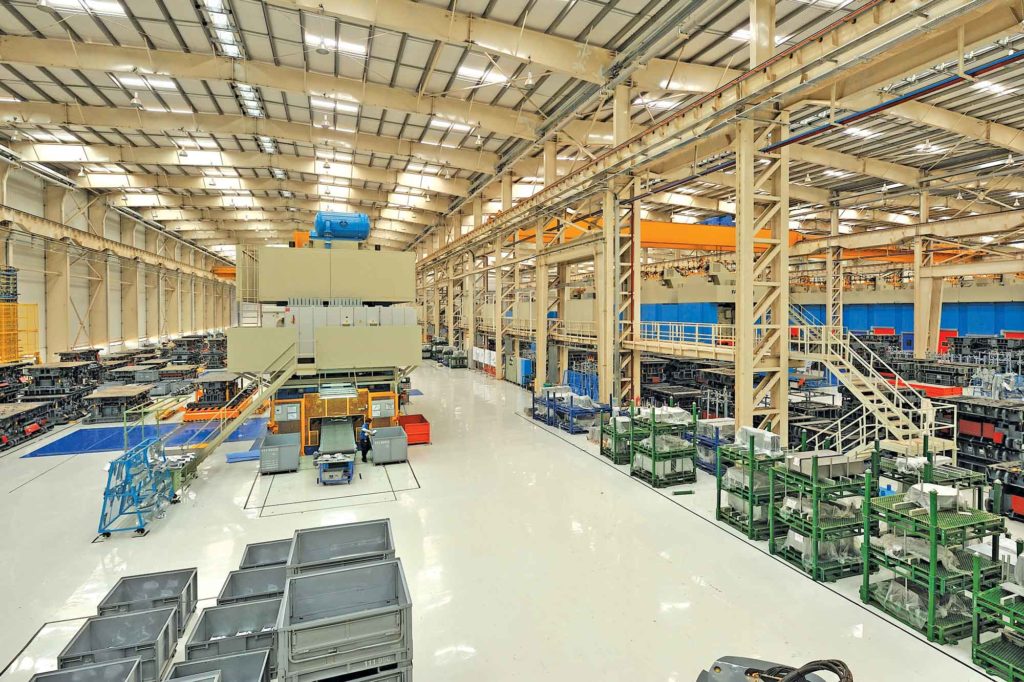Choosing the best materials for warehouse roofing is a challenging task. This article highlights the points to be considered while selecting the roofing materials.
A warehouse is a place to store goods until they are required for their use or sale. These stored goods can include any raw materials, packing materials, spare parts, components, or finished goods. Warehouses are built to protect the products from sunlight, rain, snow, wind, dust, moisture and pests.
A well-planned roof plays a vital role in maintaining the building envelope, which in turn contributes to security and durability of the materials. Maintaining the integrity of the roof is essential. This is both to ensure the safe storage of goods and for safety of workers. Whether it is a construction of completely new roof or renovating an old one, one must be aware of the materials used in its construction.
Warehouse roofing is commonly made up of either composite or twin skin roofing systems as described below.
Composite roofing
Composite roofing is probably the most commonly selected system used. It comprises of a pre-assembled roofing structure with insulation and support sandwiched between the upper and lower roofing panels; and can easily be fixed and assembled to construct the roof.
Twin skin roofing
This is similar to the composite roof as the same materials and products are generally used, but this option is the cheaper of the two in materials cost. But on the other hand, it takes more time to get built than the composite one.
According to J. P. Dhoot, Director, Panchsheel Fasteners, “New technologies in roofing materials cut down on losses due to spoilage and wastage during storage.”
Panchsheel Fasteners, an ISO 9001:2000 certified company, is one of the leading manufacturers of fasteners and allied products. The products manufactured are exported across the globe apart from having a strong foothold in the domestic market.
Mr Dhoot has pointed out some of the principles in selecting the roofing materials for warehouse:
• Type of storage – cold or normal
• Light weight materials
• Durability
• Resistant to atmospheric attack
• Easy for maintenance.
He suggested, “Products like non-hygroscopic chemicals, cements, fertilisers etc. may be kept on an elevated platform with a side enclosure and roof covering to protect from atmospheric attacks. These types of storages are either heated or unheated with normal room temperatures. These roof coverings include A.C. sheets, coated sheets, G.I. corrugated sheets.”
Perishable products require refrigerated warehouses with controlled temperatures, thus roofing sheets with insulations are needed. When choosing insulation, composition and thermal characteristics are important.
Warehouses that are constructed with vapour barriers and contain humidity control equipment to maintain humidity at desired levels are called Controlled Humidity (CH) warehouses. Even these warehouses need the insulated roofing materials.
At present, three major roofing materials are available in market. They are:
• UPVC roofing sheets
• Metal roofing sheets
• Cement roofing sheets (not accepted in major applications due to asbestos content).
According to Mukesh Thakkar, CEO of Zen Eco Homes, “With recent economic development, there will be huge demand for warehousing services and subsequently, for roofing materials.” Ahmedabad-based Zen Eco Homes provides solutions across roofing, prefab, water, construction, and industrial spectrums.
Mr Thakkar further explained the characteristics to be considered while choosing the roofing material for warehouses.
• Heat insulation: UPVC roofing sheet transmits 40 per cent heat, whereas metal roofing sheet transmits 95 per cent heat. UPVC roofing sheet gives 5 – 7 C insulation. This characteristic of heat insulation is very important for food products, dairy products, fish and sea food products, alcohol products etc.
• Weather corrosion: Weather corrosion is a major concern for coastal area roofing. As UPVC roofing sheets have no metal content, they are resistant to weather corrosion. But metal roofing sheets, despite layer of zinc coating and colour coating, are subject to weather corrosion.
• Chemical corrosion: Corrosion due to chemical fumes is also one of the major concerns. Again metal sheets are subject to such corrosion, to which UPVC roofing sheet has good resistance. No wonder, the 3 years ago introduced UPVC roofing sheets are widely accepted in pharmacy, food processing, poultry farms, and chemical plants.
Conclusion
Clearly, there are several types of roofing materials and insulation, many types of membrane systems and different ways of installing them. Several times, the local building codes may also detect the roofing type required. One has to be very careful at initial stages of selection to achieve the best-desired results.
As UPVC roofing sheets have no metal content, they are resistant to weather corrosion. But metal roofing sheets, despite layer of zinc coating and colour coating, are subject to weather corrosion
Mukesh Thakkar, CEO, Zen Eco Homes
New technologies in roofing materials cut down on losses due to spoilage and wastage during storage
J. P. Dhoot, Director, Panchsheel Fasteners
Cookie Consent
We use cookies to personalize your experience. By continuing to visit this website you agree to our Terms & Conditions, Privacy Policy and Cookie Policy.

















